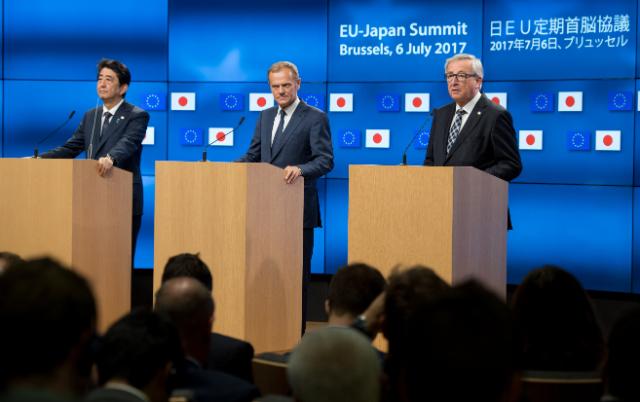Blog Archive

The Reform of the Common European Asylum System: Between Recast and New Regulation
By Salvatore Nicolosi
Twenty years after the European Council of Tampere that in 1999 set out the political roadmap to establish a Common European Asylum System (CEAS), the European Union and its Member States still struggle to design a solid and future-proof system. The migratory pressure on the EU increases the need for effective responses. With more than 1 million people reaching Europe in 2015 and more than 18,000 drowning at sea in the period between 2014 and 2019, a solid asylum system becomes all the more urgent.
The reform of the CEAS certainly constitutes a relevant context to reflect on the dynamics of regulation in a particular sensitive area of European integration. Nonetheless, a closer look at the ongoing reform illustrates how this lays behind the actual way forward to the realisation of the goals established in Tampere twenty years ago.
Read more
First Impressions of Google AdSense Decision
By Viktorija Morozovaite
The Google AdSense decision has come out on the 20th of March, 2019. With imposition of €1.49 billion fine it marked an end to the third European Commission’s investigation into tech giant’s practices, each resulting in spectacular penalties (together rounding up to €8.2 billion – a sum equivalent to Benelux countries’ annual contribution to the EU budget) and advancing the debate between competition practitioners and academics worldwide. Admittedly, the outcome did not come as a surprise to many – over the past decade, European Commission seem to have become the nemesis of giant tech companies with investigations into practices of Google, Apple, Facebook and Amazon. While the full decision is not published yet and it is difficult to comment on its merits, this blog post aims at distilling some of the ongoing issues, placing the decision in the broader context.
Read more
Europa versus Trump: hoe de Europese economische soevereiniteit te beschermen tegen Amerikaanse sancties
By Cedric Ryngaert
Premier Mark Rutte hield op 13 februari 2019 zijn veelgeprezen Churchill-lezing in Zürich. In commentaren ging veel aandacht uit naar het door hem voorgestane musculaire Europese buitenlands en veiligheidsbeleid, in het bijzonder naar zijn voorstel om Europese sanctiebesluiten met gekwalificeerde meerderheid mogelijk te maken. Premier Rutte lijkt daarbij ontzag te hebben voor hoe de Amerikanen het aanpakken, wanneer hij zich afvraagt wat we kunnen leren van de veel grotere impact van Amerikaanse sancties in vergelijking met de Europese. Net zoals de VS zou de EU volgens premier Rutte meer bereidheid moeten tonen om ‘marktmacht te koppelen aan politieke doelstellingen en economische belangen’. Het is echter niet de bedoeling dat Europa hiermee ‘de op regels gebaseerde multilaterale wereldorde’ met voeten gaat treden. Net omdat de VS dat met zijn ‘extraterritoriale’ en internationaal onrechtmatige sanctiebeleid weldoet, dient Europa de nodige maatregelen te nemen om het Europese bedrijfsleven en de Europese economische soevereiniteit tegen de Amerikaanse sancties te beschermen.
Read more
EU-Japan Economic Partnership Agreement: Data Protection in the Era of Digital Trade and Economy
By Machiko Kanetake and Sybe de Vries

On 12 December 2018, the European Parliament approved the EU-Japan Economic Partnership Agreement (EPA) which the parties have been negotiating since April 2013. The Agreement, sometimes called as the “cars-for-cheese” deal in a symbolic sense, aims to vitalize economies which represent approximately 30% of global gross domestic product. The Commission presented the final text to the Council on 18 April 2018, which authorized, on 6 July, the signing of the deal. The parties have signed the agreement on 17 July, and, on 8 December 2018, the National Diet of Japan approved the agreement. In light of the Court of Justice’s Opinion 2/15 on the EU-Singapore Free Trade Agreement, the Commission assumes that the EU-Japan EPA does not require ratification by individual EU member states since the agreement is within the EU’s exclusive competence. Investment protection standards and investment protection dispute resolution, which fall under shared competences, have been subject to separate negotiations. The EPA, which is expected to enter into force on 1 February 2019, is arguably the biggest trade-related achievement of the current Commission, which ends its mandate in 2019.
Read more
Robot Love / Robotgov
by Stijn van Deursen and Stefan Kulk

Robots are on the rise. They make life easier, they make economic processes more efficient, and they are even becoming objects of love and lust. At the same time, new ethical and legal questions arise. Should robots have rights? Can we send them to war? And, who is responsible for any ‘mistakes’ that robots make? They also make us question ourselves, and may teach us something about humanity. We can all agree that robots are not human. But what distinguishes us from ‘them’?
Read more
Legal Status of Robots: The RENFORCE/UGlobe Seminar and Why I Decided to Sign the Open Letter

Photo credits: iStock/Global_PhonlamaiPhoto
Should a robot enjoy any legal status independent of its human creators? If so, what kind of legal status would that be? Should the robot enjoy its/her/his “rights”? One’s answers to these futuristic questions might in part depend on whether one’s image of autonomous robots comes from the film Bicentennial Man (1999) based on Isaac Asimov’s novel or a more recent movie Ex Machina (2014). In the film version of Bicentennial Man, a highly autonomous robot played by Robin Williams exhibits humorous, friendly, and warm-hearted characteristics that co-exist with human communities. By contrast, in Ex Machina, a beautiful human-looking robot ended up deceiving a man and achieving freedom by taking advantage of the trust that the man developed towards the robot. While we cannot tell if such a self-governing robotic machine could ever be built, these two movies depict diametrically opposed scenarios that robots can have both beneficial and disturbing consequences to human beings.

Cambridge Analytica and Facebook Fallout: The Renforce/UGlobe Seminar
 On 11 April 2018, Facebook founder and CEO Mark Zuckerberg appeared at the US congressional hearings. At the heart of the testimony was the Cambridge Analytica fallout on the misuse of Facebook users’ data, which continues to reveal the vulnerabilities of social media companies and their impact on politics. The business model of social media companies is based on the sale of advertisements and the provision of apps which allow the social media platforms to make the most of users’ data. Their businesses’ unique strength resides in the “targeted advertising” of potential consumers — and voters. While Facebook and other similar social media generate an enormous benefit of sharing information, the companies’ reliance on users’ data triggers an unprecedented risk of information misuse, not only in a commercial sense, but also for political campaigns.
On 11 April 2018, Facebook founder and CEO Mark Zuckerberg appeared at the US congressional hearings. At the heart of the testimony was the Cambridge Analytica fallout on the misuse of Facebook users’ data, which continues to reveal the vulnerabilities of social media companies and their impact on politics. The business model of social media companies is based on the sale of advertisements and the provision of apps which allow the social media platforms to make the most of users’ data. Their businesses’ unique strength resides in the “targeted advertising” of potential consumers — and voters. While Facebook and other similar social media generate an enormous benefit of sharing information, the companies’ reliance on users’ data triggers an unprecedented risk of information misuse, not only in a commercial sense, but also for political campaigns.

Disrupting Technologies – A UGlobe Dialogue on Bulk Interception of Communications

Photo credits: iStock/Global_PhonlamaiPhoto
The UGlobe Dialogue Series “Disrupting Technologies?” hosted its first event on 15 March 2018, in the week before the Referendum on a new Dutch Law on the Intelligence and Security Services (the Wet op de inlichtingen- en veiligheidsdiensten, Wiv). This new law would extend the possibilities of secret services to monitor online behavior. Technology has changed since the usage of fixed telephony and dialup internet-access in the 1990s to the widespread use of smartphones, 4G and Wi-Fi-hotspots in 2018. So changes in the law regulating the intelligence services are necessary, and in view of the upcoming referendum it is necessary to engage in a debate on the new competences regarding these new technologies and the framework of supervision of these intelligence and security services.
Read more
De Aanbestedingswet 2012 als instrument voor het uitvoeren van maatschappelijke beleid
 Op 23 juni 2017 vond de bijeenkomst ‘beter aanbesteden in 2022’ plaats, ter viering van het eerste lustrum van het executive onderwijs op het gebied van aanbesteden en inkoop aan de Universiteit Utrecht. Tijdens deze bijeenkomst kregen PPRC-onderzoekers mr. Willem Janssen, ir. Niels Uenk en ik de ruimte om te pitchen voor beter aanbesteden. De stelling die ik mocht verdedigen: Om effectief maatschappelijk beleid te voeren is kennis van de Aanbestedingswet 2012 noodzakelijk, leverde in de aansluitende digitale stemronde 74% ‘Eens’ stemmen op. Daarna volgde een mooie discussie. Deze blog is een bewerking van de pitch. Eerder verscheen op het Renforce-Blog al een blog over de pitch van Willem Janssen.
Op 23 juni 2017 vond de bijeenkomst ‘beter aanbesteden in 2022’ plaats, ter viering van het eerste lustrum van het executive onderwijs op het gebied van aanbesteden en inkoop aan de Universiteit Utrecht. Tijdens deze bijeenkomst kregen PPRC-onderzoekers mr. Willem Janssen, ir. Niels Uenk en ik de ruimte om te pitchen voor beter aanbesteden. De stelling die ik mocht verdedigen: Om effectief maatschappelijk beleid te voeren is kennis van de Aanbestedingswet 2012 noodzakelijk, leverde in de aansluitende digitale stemronde 74% ‘Eens’ stemmen op. Daarna volgde een mooie discussie. Deze blog is een bewerking van de pitch. Eerder verscheen op het Renforce-Blog al een blog over de pitch van Willem Janssen.

Private deelname in publiek-publieke samenwerkingsverbanden: het zou verboden moeten worden!
 Op 23 juni jl. vond de bijeenkomst ‘Beter Aanbesteden in 2022’ plaats in de Raadzaal van de Universiteit Utrecht ter viering van vijf jaar aanbestedingsrechtelijk executive onderwijs. De zaal zat vol met meer dan tachtig professionals, werkzaam bij verschillende overheden, advocatenkantoren, en adviesbureaus. Voor een verslag van de bijeenkomst: klik hier.
Op 23 juni jl. vond de bijeenkomst ‘Beter Aanbesteden in 2022’ plaats in de Raadzaal van de Universiteit Utrecht ter viering van vijf jaar aanbestedingsrechtelijk executive onderwijs. De zaal zat vol met meer dan tachtig professionals, werkzaam bij verschillende overheden, advocatenkantoren, en adviesbureaus. Voor een verslag van de bijeenkomst: klik hier.
Tijdens het eerste deel van deze bijeenkomst gingen de key-notes van aanjager Matthijs Huizing van het traject Beter Aanbesteden van het Ministerie van Economische Zaken, prof. Jan Michiel Hebly (UL), en PPRC directeuren prof. Elisabetta Manunza (UU) en prof. Jan Telgen (UT) in op de vraag wat is essentieel om in 2022 beter aan te besteden? In het tweede gedeelte van het programma kregen ing. Niels Uenk, mr. Gerrieke Bouwman en ikzelf de kans om te ‘Pitchen voor Beter Aanbesteden’. Ik heb die mogelijkheid aangegrepen om in acht minuten te pleiten voor een verbod op private deelname in publiek-publieke samenwerkingsverbanden. Naderhand kreeg de zaal de kans om digitaal te stemmen via een voting tool. Deze blog is een bewerking van deze pitch.
Read more
